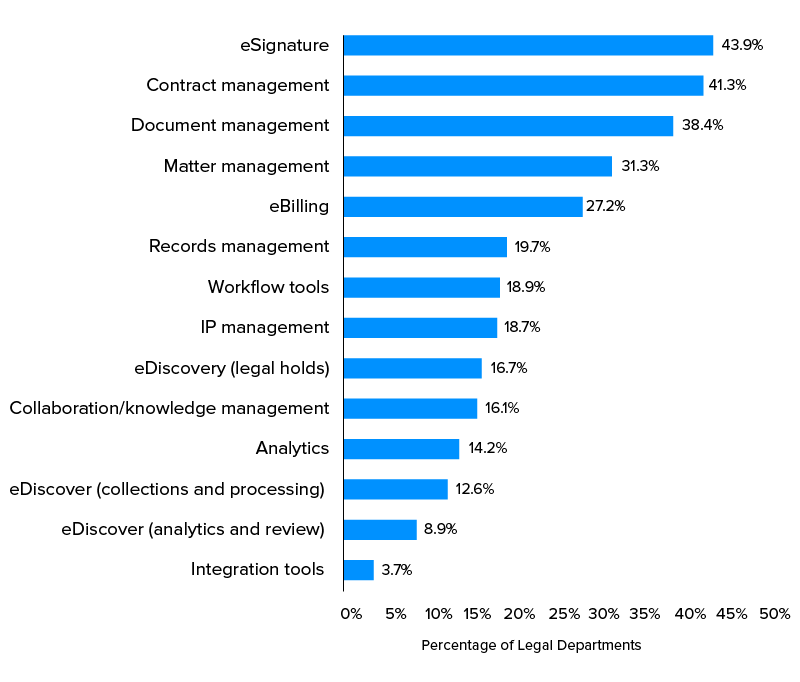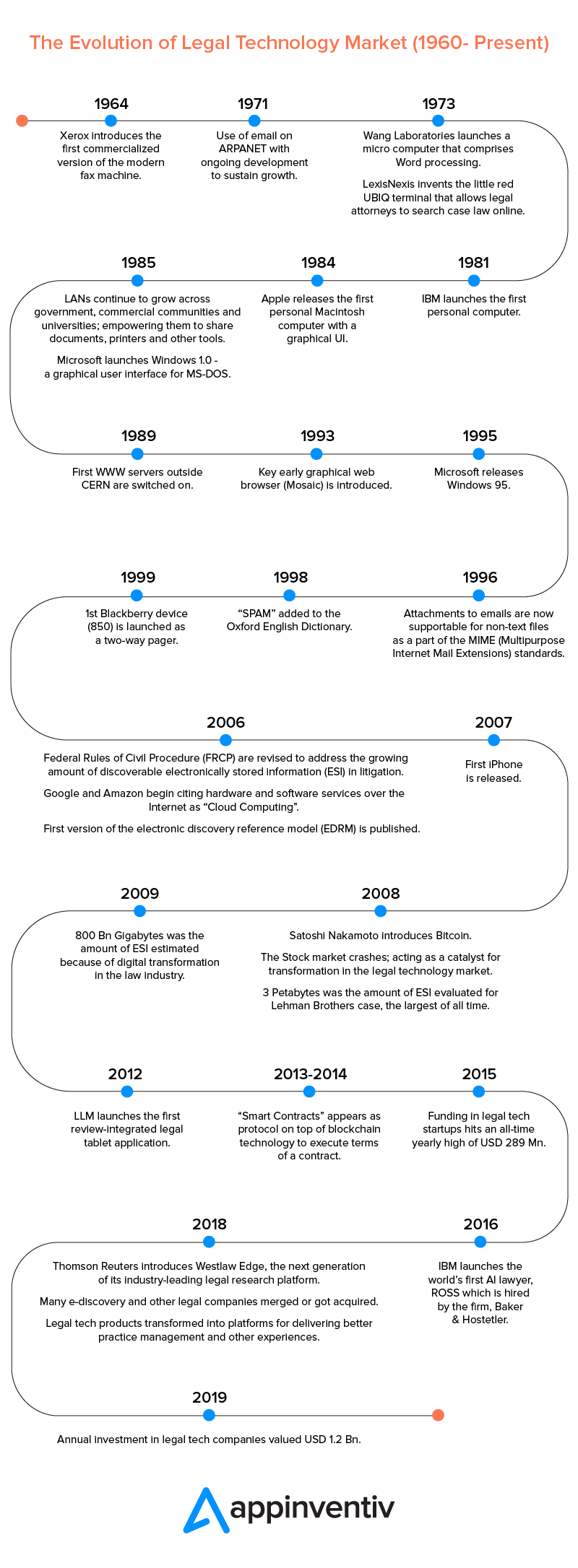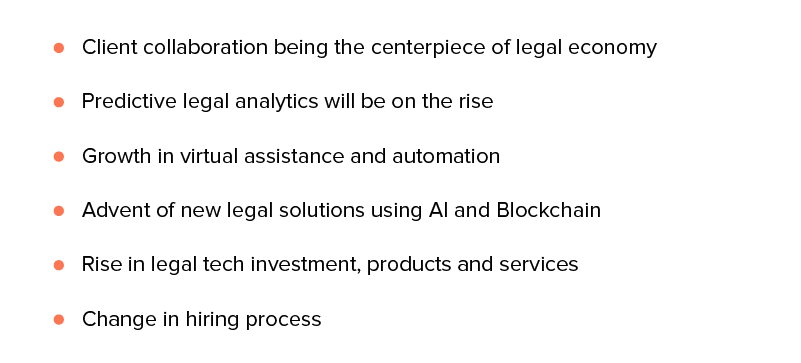A Brief Overview of the Evolution of Legal Technology Sector
Imagine you are in court, fighting a controversial legal case that could be a landmark in the history of law. You turn towards the counsel table to show important documentary evidence when you suddenly realize that you left it at your desk, back at the office.
What would you do?
If I would have asked this question back in the 1950s, you would have replied that you will try to send someone to bring the documents immediately and meanwhile capture the attention of everyone, or simply ask for another hearing from the judge.
However, these days, you can rectify the mistake by accessing the same document on the cloud via your mobile phone- all thanks to the unstoppable growth of use of technology in the legal sector. Or better say, the evolving legal technology market.
Legal Tech, aka, the segment of the legal industry that operates with the integration of cutting-edge technologies, has wholly transformed the way attorneys and law professionals work. It has brought forth better opportunities to digitally transform the law business and meet the expectations of tech-savvy clients. And interestingly, this has not remained confined to the top legal organizations; small legal teams and startups have also recognized the opportunity and invested into the same. [Know in detail here: Why Do Small Legal Teams Need Legal Operations Software?]
A ripple effect of this is that today –
1. The legal tech market constitutes 2.6% of the total legal service market share. The one that will be worth USD 1,011 Bn by next year.
2. More than 700 legal tech startups have entered the market, though belonging to different domains, i,e, eDiscovery, Online legal services, Lawyer search, Legal research, AI legal tech software, and Practice management software.
3. As per 2019 Global Legal Department Benchmarking Report, the adoption of technology in different legal areas has also increased by significant values.

4. The total investment in the legal tech market recorded in 2019 was around USD 1.2 Bn, and is expected to increase considerably this year with virtual law offices and digital courtroom being the need of the hour due to global pandemic.
5. Cloud adoption in the legal industry increases by 20% annually; indicating that lawyers are understanding the essence of replacing paper-based documents with digital ones.
Such numbers have swayed law professionals across the globe and made them interested in investing in legal firm software development, get familiar with legal tech future trends and eventually, build a business plan.
Now, while this seems a perfect roadmap to enter the legal technology market and get on the top, it is not actually so.
To ensure that you leverage higher possibilities and benefits, it is equally important to know what all changes has the industry experienced so far. Meaning, getting acquainted with the evolution of the legal tech market in the past few years and the set of technology used in law firms is also essential.
So, taking the same thought into consideration, let’s take a look back at the history of the Law technology market before heading to the future trends.
An Outlook of The Transformation of Legal Industry
What started back in the 1960s with the introduction of networked computers and the Internet with J.C.R Lickilder’s work on ARPANET, the Legal technology industry has travelled a long way towards digital transformation with the advent of advanced software solutions and other related innovations. It has introduced various automated and highly-efficient tools and platforms in different areas such as –
1. Legal Research
Traditionally, the process of legal research was time-consuming, error-prone, and tiresome, which made it difficult for the law organizations to deal with complex issues, meet the needs of their clients, and make quick decisions. However, with the advent of legal research tools and platforms like Casemaker, FindLaw and Casetext, this can become much easier.
2. Predictive Coding and eDiscovery
Also called technology-assisted review (TAR), Predictive coding technology is employed to determine responsive electronically stored information (ESI) documents. The AI-powered predictive coding and eDiscovery tools will continue to learn and make better decisions while saving time and money.
3. Digital Billing
Right from calculating GST, to managing heap of data, getting customized billings, and accessing data from the cloud, digital billing solutions are helping legal organizations with various other processes within the environment.
4. Legal Document Management
Legal document creation and management software like Clio, Smokeball and MyCase has also come forth to assist law professionals with creating, accessing, and managing all the documents and making the right business decisions.
5. Contracts Verification and Management
These types of law and technology solutions comes loaded with AI and Blockchain and
assists legal organizations in verifying and managing the digital contracts quickly, efficiently and error-free.
[Also Read: Why Do Small Legal Teams Need Legal Operations Software?]
Let’s have a glimpse of how much the law industry has changed so far, in the form of a timeline as shown by the image below.

With this covered, let’s take a look at the future of the legal tech domain and the advanced technology solutions to focus upon.
Technology Trends that Will Continue Ruling the Legal Tech Market

1. Client collaboration being the centerpiece of legal economy
The foremost trend that will continue to reform the legal landscape is focus on client collaboration.
The law organizations will focus on collaborating with their targeted user base to ensure greater transparency in their ecosystem. This will later assist in wider acceptance and adoption of secure and innovative tools for managing critical legal issues.
2. Predictive Legal Analytics will be on the rise
Switching from analytics to predictive analytics will also be one of the key trends in the legal domain. This will result in developing innovative solutions that offer higher strategic planning and other data-driven information.
Not only the new legal tech startups, but the existing ones will also plan around introducing the power of predictive analytics into their mobile apps and other solutions.
3. Growth in Virtual assistance and Automation
Another trend that will continue to prevail in the law industry is the hike in usage of virtual assistants and automation tools.
Both small firms and solos will look ahead to using these software and platforms to manage multiple tasks efficiently and effortlessly, including intaking and scheduling of meetings.
4. Advent of new legal solutions using AI and Blockchain
In 2020 and beyond, many more innovative solutions will enter and thrive the market with higher focus on blockchain and artificial intelligence in the legal field.
These legal tech solutions will help the law professionals in finding better opportunities, projecting new strategies and finding effective ways to run their business in the present competitive and client-driven market.
5. Rise in Legal tech investment, products and services
With the growing awareness of the outcomes of introducing mobile apps and technology in the legal field, there will be a rise in the number of acquisitions, mergers, and fundings. Not only the investors, but the established law organizations will also collaborate with the new startups to make a better position in the market.
This will further boost the number of legal technology consultants who will be specialized in aiding law organizations with integration of high-tech products to their existing model.
6. Change in Hiring process
Lastly, a major disruption will be experienced in the hiring process this year and beyond. The legal tech startups and establishments will look forward to hiring now-lawyers to bring a direct difference in their business. This includes those who have an expertise in sales, C-suit administration and process management.
The lawyers will keep a focus on high-level, substantive tasks while the non-lawyers will participate in improving the environment and introducing new ways of increasing business efficiency.
So now as you know what all revolutionary changes the law industry has seen with the emergence of legal technology, and what is the probable future of the market, it is the right time to look into ways to step into the market successfully.
How to Prepare for the Legal Tech Market?
While the aforementioned information will help you to understand the present and future state of the market, there are two more essential ingredients to make a successful entry to it. So, let’s wrap up this article focusing on the two, which are as follows –
1. Identifying the challenges and opportunities
To get the best perks of considering legal software development, it is important to know why you need them. That implies, it is required to have a clear understanding of what challenges you are facing with the traditional business processes, what opportunities you are missing out, and how the legal technologies can be the right solutions.
Something that can be figured out by discussing your business model with your team, doing an extensive market and competitor analysis, and pondering on the vision and mission of your law organization.
2. Hiring the Right Legal Software Development Company
Though a wide range of technology solutions providers have shown the potential to create amazing software for legal firms, not all are the best option to go with. This is because every legal project requires a different skill set and experience.
When finding an answer to how to hire legal technology solutions providers, it is must to consider their experience, team size, location, portfolio, tech stack, and other such factors.
Have any further questions? Feel free to contact our legal firm technology consultants.

strategies your digital product..






